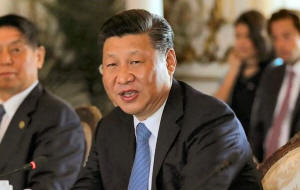|
Exclusive: China seeks to cement
globalization credentials at Silk Road summit
 Send a link to a friend
Send a link to a friend
 [April 26, 2017]
By John Ruwitch and Ben Blanchard [April 26, 2017]
By John Ruwitch and Ben Blanchard
SHANGHAI/BEIJING (Reuters) - China says its
Silk Road initiative is helping create "a new era of globalization" open
to all, according to a draft communique for a summit next month on the
project, as Beijing burnishes its free trade credentials amid
protectionist forces elsewhere.
Leaders from 28 countries will attend the Belt and Road Forum in Beijing
on May 14-15, an event orchestrated to promote Chinese President Xi
Jinping's vision of expanding links between Asia, Africa and Europe
underpinned by billions of dollars in infrastructure investment.
Although only one Group of Seven leader is due to attend, the forum will
be China's biggest diplomatic event of 2017.
It offers Xi a chance to flesh out China's global leadership ambitions
as U.S. President Donald Trump promotes "America First" and voters in
some European nations turn against globalization.
The government is pulling out the stops to make it a success, offering
soothing words about sharing the bounty of economic growth and promising
inclusivity.
Companies in some host countries complain they are being frozen out of
major "One Belt, One Road" projects while China's state-owned firms grab
the lion's share.

Many Western countries also worry about a lack of detail and
transparency in the project and are suspicious about China's broader
political intentions behind the Silk Road.
"Our joint endeavor to promote the Belt and Road Initiative provides new
opportunities and impetus for international cooperation," said the draft
communique, seen by Reuters but open to revisions.
"It helps to usher in a new era of globalization that is open, inclusive
and beneficial to all."
Diplomats briefed on China's thinking say Beijing hopes to make the
summit an annual event.
"CIRCLE OF FRIENDS"
Chinese Foreign Minister Wang Yi last week compared the project to a
"circle of friends" open to all countries that share the same goals,
rather than an exclusive club.
Still, state media has proclaimed China's key role in the Silk Road and
how Beijing plans to use it to challenge the West.
The official Xinhua news agency, in a commentary on the front page of
the People's Daily earlier this month, lauded the project as the "China
solution" for the world's economic woes.
Zhao Lei, a professor at the influential Central Party School that
trains rising officials, told the China Daily the initiative was "poised
to provide more inclusivity than the Western-led elite clubs".
A senior Beijing-based Western diplomat said the May forum was an
attempt to "institutionalize" China's otherwise amorphous "One Belt, One
Road" scheme, while building its clout.
A senior Indonesian official told Reuters the Chinese were "gunning for"
global leadership and that the summit would be a big deal.
Others, meanwhile, think the "One Belt, One Road" forum is something
positive for proponents of globalization, as the United States and parts
of Europe retreat to more protectionist positions.
"The uncertainly over Trump and his 'America First' is leading countries
to realize they need to get on good terms with China," said a senior
Asian diplomat, whose country will be represented by a top leader at the
summit.
[to top of second column] |

China's President Xi
Jinping speaks during a bilateral meeting with U.S. President Donald
Trump at Trump's Mar-a-Lago estate in Palm Beach, Florida, U.S.,
April 7, 2017. REUTERS/Carlos Barria

"It's a great exercise in soft power for China and great timing."
PUBLIC GOOD
The proposed communique for the "leaders' roundtable" on May 15,
drafted by the Chinese Foreign Ministry, is under discussion among
countries planning to attend and revisions are likely, a source with
knowledge of the process said.
It said "One Belt, One Road" had already become "a major
international public good" since its introduction three years ago.
The focus was on enhancing connectivity between Europe and Asia but
the scheme was "open to the rest of the world", it added.
The communique, expected to be published at the end of the summit,
backed "upholding the rules-based, transparent, non-discriminatory,
open and inclusive multilateral trading system with the WTO at its
core".
Some of China's most reliable allies and partners will attend the
forum, including Russian President Vladimir Putin, Pakistani Prime
Minister Nawaz Sharif, Cambodian Prime Minister Hun Sen and Kazakh
President Nursultan Nazarbayev.
However, only the Italian prime minister will attend from the G7,
according to China's foreign ministry.
Diplomatic sources in Beijing said China had hoped for at least some
senior Western leaders to attend to strengthen the plan's image and
make it less China-centric.
Beijing is sensitive to any suggestion that what it projects as
benign intentions do not have a receptive global audience,
especially in Western capitals.

But suspicion about China's motives runs deep.
"It's not win-win, as the Chinese like to say," said a senior EU
diplomat. "It is China seeking to dominate."
Other Western diplomats have expressed concern in private about the
attendance of Putin and other leaders from countries with poor human
rights records, suggesting that has contributed to senior Western
leaders staying away.
(Additional reporting by Robin Emmott in Brussels and John Chalmers
in Jakarta; Editing by Mike Collett-White)
[© 2017 Thomson Reuters. All rights
reserved.]
Copyright 2017 Reuters. All rights reserved. This material may not be published,
broadcast, rewritten or redistributed. |